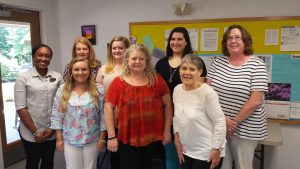Mary Anne Salmon, PhD has taken on the grand challenge of social isolation for over 20 years. As a Clinical Associate Professor with the Center for Aging Research and Educational Program (CARES) in the Jordan Institute for Families, Mary Anne is committed to creating conditions where all seniors can age with grace.
What does she wish everyone knew? First, senior centers are NOT residential. No one lives there! Senior centers are places that provide community and services to help keep older adults healthy and productive. Centers offer fun activities such as Zumba, line dancing, shuffle board and chair yoga to support active life styles and help people deal with the natural physical challenges of aging such as arthritis. Centers provide education to seniors along with activities such as writing and drama groups, bands, knitting groups and coordination for some of the very extensive volunteer services that seniors provide in their communities. They also engage seniors in advocacy efforts. Senior centers provide support to aging adults at all levels of care. As such, they also provide information and assistance to families who are caring for aging and fragile members. It is difficult to separate health needs from the need for social support and preventive health services. These needs are all interconnected and important.
How does she know so much about senior centers? Well, Mary Anne is part of a team that visits about 25 centers a year across North Carolina assisting the NC Division on Aging and Adult Services and Area Agencies on Aging with senior center certification. The first two senior centers were certified in 1999 following several years of work to develop the process. All senior centers receive some funds from a general fund via a “share” system. In fiscal year 2017-18, one share of the funds is $4,863. This consists of $3,647 state and $1,216 local funds. Uncertified centers receive one share. Centers of Merit receive two shares, and Centers of Excellence receive three shares.
[pullquote_left]A committed center director and team is the secret sauce for success. Their ability to build partnerships in the community, think creatively and live out their passion for this population is what makes for excellent service.[/pullquote_left]To receive these funds centers must go through a fairly extensive process of documenting how they are meeting standards of care. These materials are submitted to a team of partners led by the NC Department of Aging and Adult Services along with a representative from the Area Agency on Aging for that center’s region, the Senior Tarheel Legislator from that center’s county, two or more representatives of senior centers from outside the center’s region and Mary Anne. The documents are carefully reviewed. The team then reaches out to the center directors for clarification as needed and schedule a one day in person review. The purpose of the review and visit is to provide technical assistance and support to the centers so that they in turn can provide the best possible care and services in their communities.

Mary Anne also emphasized that older adults are a very diverse group of people with unique needs and many gifts. People in the “senior” category run across a 40-year age span with varying histories, fitness levels, talents and interests. Programs that serve them, therefore, need to be tailored and require lots of volunteer work. What is often not recognized is the significant time older adults spend helping each other and serving as volunteers. Seniors are often a very active and engaged group. However, when they become vulnerable they have a lot of needs.
The CARES program was started in 1987 by Dr. Gary Nelson and continues to seek ways to meet the needs of America’s growing aging population. Dr. Salmon takes her work to a policy level through her role as a member of the Governor’s Advisory Council on Aging where she represents the Jordan Institute and School of Social Work. Educating legislators and the public about the growing needs for resources to serve the aging “boomer” generation is one important issue. While this generation spans a few decades, her concern at the moment is caring for the first wave of this cohort – those who are 80+. There are long waiting lists for in-home aids and in-home meals. As Mary Anne notes, “It is hard to tell a person who is in their 90’s that they are on a wait list”. As a faculty member, Mary Anne also works with the Rethinking Guardianship Initiative, evaluates online training for child welfare workers, serves on the Schools IRB committee, and sets the bar for others by the way she actively seeks to continuously learn and build her own skills. She is a regular attender at the diversity committee book discussion groups and rarely misses social justice and racial equity programs at the school. With her infectious smile and kind support, Dr. Salmon is a great role model for everyone no matter where they are in their life span at the Jordan Institute.
